Martin Smith gives us an exclusive listen of his new solo album, opens up about his insecurities and explains how the pandemic has changed him for the better
Twelve years ago, the most successful Christian band that the UK has ever seen gave their final performance. The venue for this momentous occasion was not a church, but a sold out Hammersmith Apollo.
A secular venue for the Delirious? swansong made sense. While they have penned many worship classics still sung in churches around the world (‘Did you feel the mountains tremble?’, ‘I could sing of your love forever’, ‘Majesty’) the band were always thirsty for mainstream success. A handful of their singles entered the top 40 around the turn of the millennium and they supported Bon Jovi on tour. The nation’s biggest music magazine at the time, Q, in a world-class example of completely missing the point, infamously said of the band: “without God they could be massive”.
The desire of Delirious? frontman and principal songwriter, Martin Smith, to reach the masses is undiminished since those days. He loves leading worship in church (“I’ve given my life to it. I believe in it”) but doesn’t want to be constrained by it. Performing at Glastonbury is top of his bucket list and when I ask him about dream collaborations he doesn’t hesitate: Adele, Coldplay’s Chris Martin and Stormzy (“I think I could retire after a day with Stormzy”).
I’VE ALWAYS HATED THE SENSE OF BEING CONSTRAINED WITHIN A SUNDAY MORNING BUBBLE
For Premier Christianity’s first in-person interview in 18 months, we’re meeting Smith in his home on the south coast of England. When I arrive, along with our photographer, Smith introduces us to his wife, Anna, before tinkering with an impressive looking coffee machine and producing two perfect flat whites. I comment on the music playing from the built-in speakers in the kitchen ceiling and Anna remarks that a top-notch home stereo system was a “must-have” for her music-obsessed husband.
Fresh from a run along Brighton beach, Smith is relaxed throughout our conversation, which takes place in the family’s immaculate living room. We’re speaking ahead of the release of his fourth solo album, Dancing In The Fire, which has emerged out of the ashes of Covid-19. The pandemic has had a profound effect on Smith. The songwriter’s travel bag had been “half-packed” for all of his adult life, but Covid changed all that, and as gig after gig was cancelled, it led to a significant crisis of identity for the singer: “Who am I? I’m just the guy at home that’s mowing the lawn and going for walks.”
Arguably the strongest single from the album, ‘Trouble’, sees him team up with the Kingdom Choir to declare: “I’m gonna sing my way out of trouble.” That plan seems to have worked: fans are left with a joyful, faithful and uplifting record. The 51-year-old has just become a grandad (“I’m called ‘pops’ at the moment”) but tracks like ‘Fire in your eyes’ are sung with such energy and drive, you’d think they were written by someone half his age. What’s the secret to his youthfulness? “Music,” he says. “It’s like a river running through your veins.”
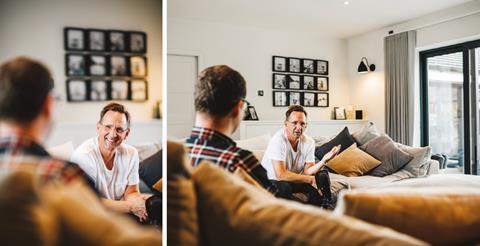
Some might assume as you get older, you’d stop listening to what’s in the charts. But you’ve kept up with new music that’s coming through. Why is that?
Early on, I was part of a recording studio in Eastbourne and became exposed to many different styles of music, from local punk bands to Graham Kendrick doing a worship record. My love and appreciation of music began then. And that has always grown in me.
So yeah, people would be surprised that I really love Dua Lipa, or Kanye [West], or Chance the Rapper or some classical music. I do have a wide appreciation, but what happens is, when your kids become teenagers, suddenly there’s this influx of new music into the house, and where your own style starts to wane a bit – I’m still listening to U2 and Foo Fighters – they’re bringing in all this new stuff, and that’s brilliant.
Whenever you pop up on my social media feeds, it looks like you’re having a lot of fun together as a family. Is Instagram giving me a misleading picture, or is that the reality?
Yeah, you know, we never argue, we never fall out. [Laughs]. No, in some ways, we’re pretty normal. But we do have a lot of fun. We’re extremely blessed to have a [positive] culture – and I think it comes from my wife, Anna. She’s extremely present. She’s a great mum, she’s given her life to bringing up the kids. And she’s never been distracted by, I need to write a third book. All those things are amazing, but she’s been the steadying force in our family. She’s always encouraged conversation around the table. And we do have a rule in our house that there’s nothing that can’t be talked about. So Anna and I tell ourselves: “Remember, when our kids start talking, just pretend you’re not shocked!”
What does the average day look like for you?
My usual day is taking the school run, and then I’ve got a couple of options: run on the seafront, or run in the hills. And I try and do that most days when I’m at home. Then there’s all sorts of meetings and things to do, phone calls or seeing people. I find now, being that bit older, I’m starting to be a bit kinder to myself in terms of my time. I’m trying to have a little bit more bandwidth in the day.
Was that a conscious decision to slow down?
Yeah, it was. I’ve been very focused over the years. I’ve always had a strong work ethic, which has come from my family. But then of course that goes on and on. You never reach a point of: Great, I’ve done it. Especially with music, because there’s always another song, another project. So I’ve had to train myself intentionally to slow down.
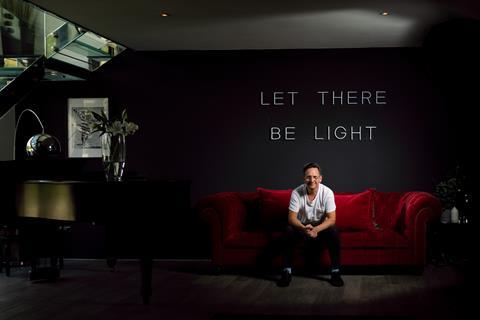
Your new album Dancing In The Fire was born out of the Covid lockdowns. Tell us how it came about.
I came home from America, because there was a break in the tour. I had three days here, and then I was meant to fly back out. I was just about to jump in a cab to Heathrow when the American tour guy said: “Don’t bother coming, it’s all been cancelled.”
I remember sitting here, on my own, at five in the morning thinking: I think life’s about to change. And it was just like a switch flicked. For some reason, I just knew that this was not going to go away quickly.
And then began the season that everyone entered. It’s been the longest time that we’ve had in our married life of being together in one stretch, and it’s been amazing. It’s been a gift because, for the whole of our 27- year marriage, my bag has always been half-packed. That’s been hard. And the more we decompressed, we realised: Wow, we’ve done alright to survive that, by the grace of God, really. It’s actually been amazing for us to have some conversations together that were probably overdue.
The context for these songs was being at home more, being incredibly grateful for my family. But I was also writing out of a sense of uncertainty, anxiousness, fear. All my work got cancelled. And there was a lot of tears, a lot of panic – all the things that, as a Christian, you aren’t supposed to feel.

Where did those emotions come from?
For a little bit, there was a sort of: I don’t know what to do without being on a stage and doing all the magic tricks. When I say ‘magic tricks’, I mean that in a sincere way. It’s like, God anoints you and has called me to do that. But the public nature of [worship leading] is that you learn things along the way: how to make a service great, or how to string songs together. It’s not a bad thing, but you realise when it stops, there’s a bit of an over reliance on that. I’ve been running so hard all these years. You have to question: Is it the songs that are making all this happen? Where’s my trust in all of this? And who do I trust? Or do I like being in control? They’re the things I’ve been learning. I’m not a spiritual worship leading robot. I’m actually a person! I’ve been tending to that side of me.
There were some scares in there. There were some quite high-profile incidences of preachers getting into trouble. Some of those were my friends, you know. I think that all played into this sort of post-evangelical rock star notion that you can be a demigod. And that’s complete nonsense. It’s right that we recognise that we’re skin and bones, we come from dust, we end up as dust. I think that’s been a great revelation to me, that the more I can keep in my place, the more my revelation of God is huge. And I want to stay in that place. He’s the one that’s amazing. He is almighty and majestic. I’m just the guy from Littlehampton.
THERE WAS A LOT OF FEAR, A LOT OF TEARS, A LOT OF PANIC – ALL THE THINGS AS A CHRISTIAN YOU AREN’T SUPPOSED TO FEEL
When you’ve got friends who are having ‘falls from grace’ and there’s all this bad news in the Church world – how do you cope with that? How do you not become cynical of Church – or even of God?
On a bad day, you can become cynical. I think: Oh, my goodness, what am I involved in? And even: Do I even believe this any more? It’s OK to have those thoughts in the morning, but by the end of the day, you need to remind yourself of all the amazing things that God has done. And I’m a part of that miracle. The fact that he knew where I was as a child and he found me and pulled me into what I’m doing now is a miracle. So I’m reminded of that and, of course, unless you’ve got a friendship with God, you’re doomed, aren’t you? There is nothing. All the religion, the knowing, the textbooks – it’s all dust. But if you can wake up in the morning and go: Can we do another day together? I think that’s a great place to start. Try and keep your hands clean. Keep life simple and do the right stuff. Stay out of trouble. That’s probably always been how I’ve approached life, to be honest.
It is not a cynical, doubting kind of album. There’s a lot about faith and a quiet confidence that God’s bringing me through this…
Wow, that’s really encouraging. I felt like I was being rebuilt. And without the bright lights and the smoke machine and hearing affirmations of: “Martin’s done another night, it’s incredible” – if you take all that away for a year and a half, you have to do a lot of soul-searching; a lot of looking in the mirror and going: Do I like who I’ve become? Am I a good husband? Am I a decent dad or a good friend to people? How often do I call my mum? I’ve been trying to put some better foundations in for the next season. As things are opening up, and I’ve had the joy of playing music and leading and making this record, I do feel incredibly childlike. It feels like the first time.
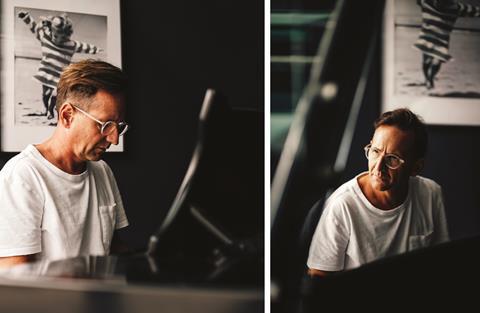
It sounds like Covid has changed you.
Does it?…I think it has to, doesn’t it? For me, it’s probably been in the simpler things, like getting to the ninth Saturday in a row where I’ve not been away. For the first time in my life, I watched Strictly Come Dancing with fish and chips. It was absolutely massive that it got to Friday and my kids weren’t expecting me to be away.
There’s always been this culture of chaos in our household, where Dad’s away, or he’s coming back, and then we squeeze everything in. I’ve been able to really enjoy and rest in the simpler things. My daughter Ruby and me, we’ve been swimming in the sea, getting freezing cold and screaming and thinking: What on earth are we doing? Other people might think that’s a bit boring. But for me, that’s been really significant.
At the same time, you must be eager to get back to playing live music?
Yeah and I think that’s another thing I’ve learned. You can’t be over spiritual and say: “If you take music out of my life, I’m totally secure in who I am.” That’s not true. We are who we are, because that’s what we love. If you think of God as being a great dad – and the opening line of the Lord’s Prayer is ‘our Father’, which fascinates me – I get the feeling that actually, God likes what I like. So if I love being on a stage and singing, then I think he probably likes that about me. So if I’m not doing that, he’s probably a bit sad for me. So my connection with God isn’t just sitting in a field and gazing at the stars, however wonderful that is, it is through what I’m made to do.
This might sound a terrible admission, but I’m actually a really lousy pray-er, in terms of switching everything off and getting my list out. But if you put music behind me, I can pray for three hours straight, it’s just that I’m singing it.
UNLESS YOU’VE GOT A FRIENDSHIP WITH GOD, YOU’RE DOOMED, AREN’T YOU?
One of your new songs, ‘Eyes are on you’ is inspired by a passage in the Old Testament that I’ve heard a lot of Christians quoting during the pandemic.
Yeah, someone sent me the scripture from 2 Chronicles 20. It’s the story of King Jehoshaphat sensing that he’s going to lose the battle. As with many stories throughout the Bible, there’s that moment of revelation, of: If we can only look up and trust that God will deliver us. And that sentiment never gets old. So, the line in the song is stolen from that scripture: “We don’t know what to do / But our eyes are on you.”
The story leads to victory, people singing together and the line: “Give thanks to the Lord, for his love endures for ever.” If you take the ‘singing together’ thing away from communities, you can see how sad people get. We’ve had a season of no live music, no theatre, opera, clubbing, dancing. If you take that out of culture, it’s amazing how much depression comes in. I think we’ve all felt that.
Yesterday, I was at church leading [worship], honestly, it’s incredibly emotional when people start singing together. And that’s not unique to the Church. It could be a Coldplay gig. There’s something about when people lift their voices. It’s like: Oh, I think we’re all made to do that. And that is the sound of victory, I think.
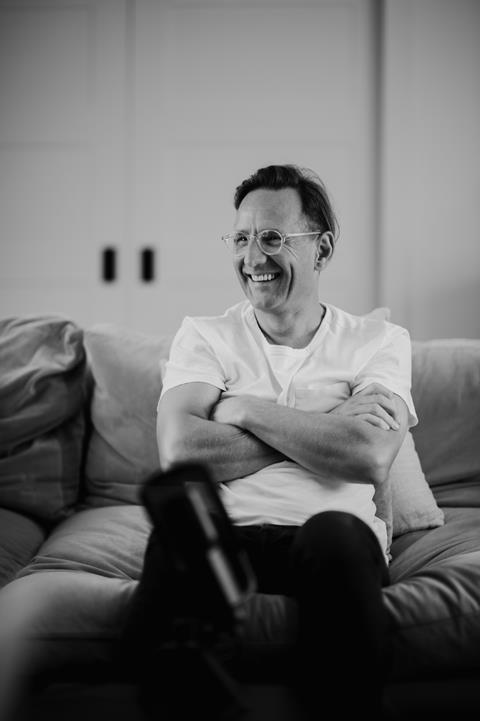
A couple of months ago, when you and I were talking about doing this interview, you said: “I’d love to sit down and do this interview Sam, because I’ve never really had the chance to explain myself.” What did you mean by that?
Oh, that sounds very insecure, doesn’t it?! Well, I mean, you know, I’ve always done different things. And I’ve always created confusion, I think.
To use a cricket analogy, I don’t think it’s ever been a straight bat down the middle. Because I’ve been a music fan, and always turned on by other influences, I’ve always hated the sense of being constrained within a Sunday morning bubble. I’m a fan of all that and I love church. I’ve given my life to it; we brought our children up in it. I don’t think you can do without it, but I’ve always fought against the religious side of: It has to be a certain way.
We have to remind ourselves that it’s us that set the style. I don’t think God has suddenly said: “What I really like is drums, bass, soft electric.” You’ve only got to travel around the nations to know that notion is not plausible. It’s only in our white middle-class churches that we seem to believe that might be true. So that annoys me. I want to always stand up for musicians who are on the fringes, and a bit quirky, but they’re carrying such fire in their bellies. I want to celebrate those people and say that there’s room at the table for everybody. I think that’s really what my mission in life has been. Everybody’s welcome around the table, especially creatively. And actually, church could be extraordinary if we embrace that.
Are you trying to undermine some of our assumptions about what a congregational worship song has to sound like?
I’m not saying that we don’t need proper congregational songs. My friend, Matt [Redman], wrote ‘10,000 reasons’, and I happen to think that’s possibly the greatest congregational song of the last ten years – maybe more. Thanks to people like that we have those hymns that are the bedrock of what we call Church. But you have to also keep one eye on the future of what teenage kids are bringing through, and that would be my heart. We’d be foolish not to think that it’s going to look different in 20 years.
I think you’re right, but if we want young people to bring fresh styles, we need them in our churches. And most churches are failing to attract young people.
Kids only grow where they’re loved. And whether they play guitar, paint or are a computer programmer – whatever they do – they’re only going to give all of who they are if they feel loved in that environment, or they’re appreciated… or even just welcomed. If they get that feeling that: Well, you’re half-welcome, but you’re not quite ready yet for what we’re doing, then shame on us.
If you haven’t got a culture of family in your church, you are absolutely shot. What’s the point of doing anything? If you don’t have that, you’re never going to get their creativity. They will withhold it from you. It’s too precious. And you’ll find all this amazing art, photography, sculpture, script writing is happening, but it’s happening in the shadows rather than in our family. That really upsets me. It has to change.
HE IS ALMIGHTY, HE IS MAJESTIC. I’M JUST THE GUY FROM LITTLEHAMPTON
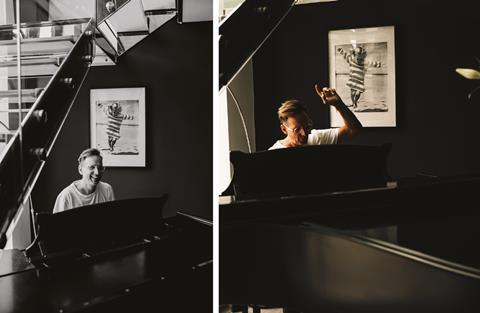
You spoke a moment ago about not wanting to feel constrained. You created a new band, Army of Bones, to help with that – and you recently played a mainstream festival with that music.
Yeah, we did. And actually, those moments where I get to play in a different context, outside the Church, with people standing in the crowd with a beer heckling, I really enjoy that. It keeps me real about the whole thing, somehow.
The Army of Bones record – and I might never have said this – is actually a love letter to Anna. All the worries and the things you could never really talk about is in that record, if you’ve got ears to listen. There’s even a song called ‘Do you love me?’. For someone like me, a shiny, got-it-all-together worship leader in the post-evangelical aren’t-we-all-amazing Church, it was important for me to say: “It takes hard work to stay in relationships. It takes good decision-making. If you want to stay married, you’ve got to commit yourself and do the honourable thing.” That’s not the average thing I can talk about in the third song in on a Sunday morning. But as a leader, if I don’t talk about the whole picture of my life – call it the whole gospel – I’m robbing my children’s generation of the true story.
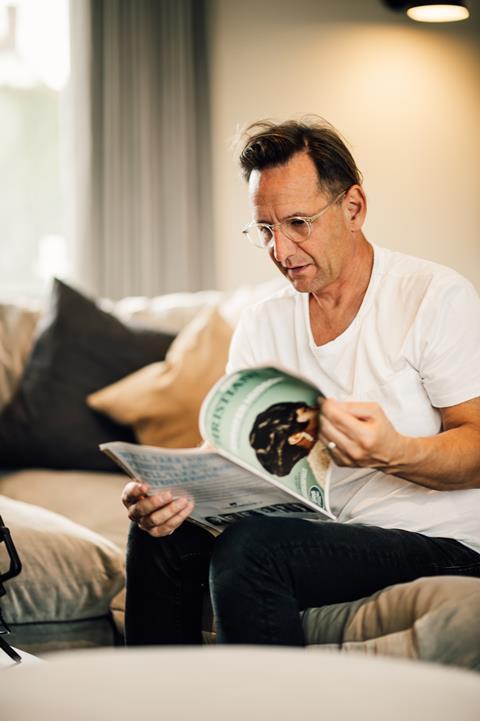
Before we finish, I have to ask you… What’s the latest on a Delirious? reunion?
Well, it’s been eleven years now! There isn’t a reason why it couldn’t happen, it’s just whether that’s what we want to do. I don’t think there will be a sense of: “We’re going to get the band back together and start climbing the ladder again.” I think it’ll be more like: “Hey, should we just do this as friends? Just for fun?” So I wouldn’t rule it out.
I knew you wouldn’t rule it out. But can I get you to rule it in?
Oh, what can I say, Sam? You’ve nailed me…!
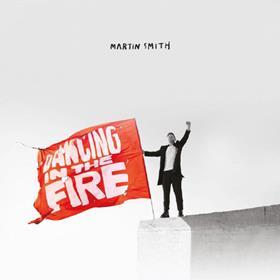
Dancing In The Fire is released 4 February. The singles ‘Dancing in the fire’, ‘Trouble’ and ‘Fire in your eyes’ are available now at martinsmith.tv
To hear the full interview listen to Premier Christian Radio at 8pm on 19 February or download The Profile podcast
All photos (c) Atlas Photography







































